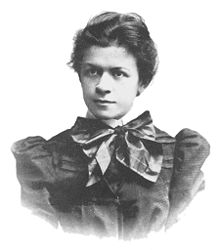Albert Einstein’s Love affair and his Marriage
In 1896, Albert Einstein, at the age of seventeen, enrolled in the four-year mathematics and physics teaching diploma program at the Zurich Polytechnic.Einstein's future wife, Mileva Marić, also enrolled at the Polytechnic that same year.
She enrolled for the diploma course to teach physics and mathematics in secondary schools at the same time as Albert Einstein. She was the only woman in her group of six students, and only the fifth woman to enter that section. She and Einstein became close friends quite soon. During the next few years, Einstein and Marić's friendship developed into romance, and they read books together on extra-curricular physics in which Einstein was taking an increasing interest.
.jpg) Albert Einstein.
Albert Einstein.
 Mileva Maric.
Mileva Maric.
In 1900, Einstein was awarded the Zurich Polytechnic teaching diploma, but Marić failed the examination with a poor grade in the mathematics component, theory of functions. Marić's academic career was disrupted in 1901 when she became pregnant by Einstein. When three months pregnant, she resat the diploma examination, but failed for the second time without improving her grade. She also discontinued work on her diploma dissertation that she had hoped to develop into a Ph.D. thesis. She went to Novi Sad, where her daughter, referred to as Lieserl, was born in 1902, probably in January. Her fate is unknown: she may have died in late summer 1903, or been given up for adoption.
Einstein married Mileva on 6 January 1903, although his mother had objected to the match because she thought Marić "too old" and "physically defective." Their relationship was for a time a personal and intellectual partnership. In a letter to her, Einstein called Marić "a creature who is my equal and who is as strong and independent as I am”. In 1904 their first son Hans Albert was born. In 1910 their second son Eduard was born.
The marriage had been in difficulties since 1912, in the spring of which Einstein became reacquainted with his cousin Elsa Löwenthal (née Einstein), following which they began a regular correspondence. Marić, who had never wanted to go to Berlin, became increasingly unhappy in the city. Soon after settling in Berlin, Einstein insisted on harsh terms if she were to remain with him. In the summer of 1914, Marić took the boys back to Zurich, a move that was to become permanent. Einstein made a commitment, drawn up by a lawyer, to send her an annual maintenance of 5600 Reichsmarks in quarterly installments, just under half of his salary. The couple divorced on February 14, 1919. They had negotiated a settlement whereby the Nobel Prize money that Einstein anticipated he would soon receive was to be placed in trust for their two boys, while Marić would be able to draw on the interest, but have no authority over the capital without Einstein's permission. After Einstein married his second wife in June, he returned to Zurich to talk to Marić about the children's future, taking Hans Albert on Lake Constance and Eduard to Arosa for convalescence.
In 1922, Einstein received news that he had won the Nobel Prize in November and the money was transferred to Marić in 1923. The money was used to buy three houses in Zurich: Marić lived in one, a five story house at Huttenstrasse, the other two were investments. In the late 1930s the costs of Eduard's care—he had been diagnosed with schizophrenia and institutionalized at the University of Zurich psychiatric clinic "Burghölzli" —overwhelmed Marić and resulted in the forced sale of two of the houses. In 1939 Marić agreed to transfer ownership of the Huttenstrasse house to Einstein in order to prevent its loss as well, with Marić retaining power of attorney. Einstein also made regular cash transfers to Marić for Eduard's and her own livelihood. Marić died at the age of 72 on August 4, 1948 in Zurich.